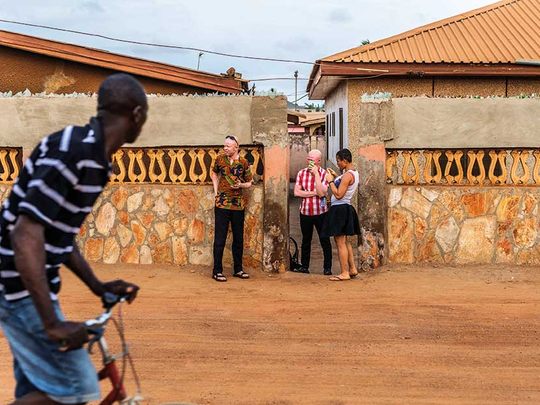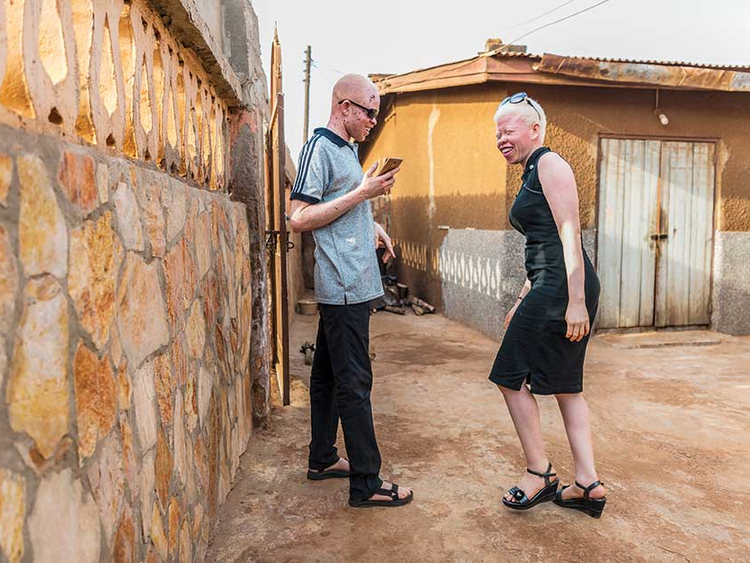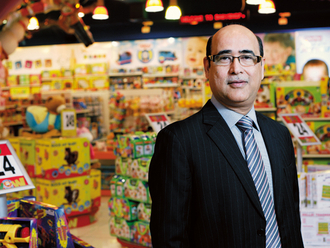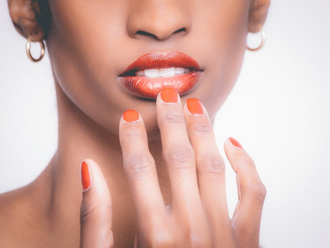
When Bernice Agboada was 15 years old, she dropped out of high school because she couldn’t see the blackboard. The humiliation of walking to the front of the class to see what her teacher was writing was exacerbated by constant ridicule from her classmates. Two years later, she returned to school and began to pay someone to take notes for her.
Now 19, Agboada has big dreams of going to law school, singing professionally and modeling, but first she needs to complete her final year of high school, which means her day begins and ends on the privately owned minibuses known as tro-tros that she takes to school in Accra.
When she boards the bus, she is met with cold stares from people who sometimes whisper words like “obroni” or “ofri”, meaning foreigner or white. “Nobody wants to sit with me, even when the car is full,” she said.
Agboada has pale skin and noticeable scars from years of exposure to the sun. She is among the Ghanaians who have albinism, a recessive condition that drastically reduces the amount of melanin in the skin and can lead to problems like vision loss and skin cancer.
To say that Ghanaians with albinism are stigmatised is an understatement: Some believe their presence is a sign of bad luck, leading their parents to avoid acknowledging them or even to try to kill them. Others believe their body parts can bring fortune and prosperity, prompting people to kill them or traffickers to sell them for their body parts — though this happens less in Ghana than in other African countries such as Mozambique, Malawi and Tanzania.
In a population of roughly 28 million people, Ghana has about 2,000 individuals with albinism, according to Kwame Andrews Daklo, a social worker focused on albino advocacy with Engage Now Africa, a nongovernmental organisation that provides medical services, clean water and business training to communities in Ghana and other African countries.
People in Ghana with albinism have been largely isolated from one another and unable to get the resources to help them battle the unforgiving sun and a world that thinks them disposable. But in recent years, they have forged connections on platforms like Facebook and WhatsApp, turning a societal stigma into social bonds and offline friendships.
Experiences for people living with albinism vary according to class, age and how pervasive the condition is on the body, but for those living in Accra and in rural villages outside of the capital city, the stigma often leads to severe neglect and ridicule.
“There were several attempts by my father to kill me because I was born with albinism,” said Adam Abdul Wahab, a news editor who was born and raised in a village near Tamale, in Ghana’s northern region. “They thought I was from another world, and some spiritual people wanted to take my life.”
Wahab’s grandfather stopped the would-be killers, but he still remembers almost dying.
Wahab says that more than 30 years later, there is still very little media attention or education about albinism. Though Wahab is an advocate for people with albinism on behalf of the Ghana Federation of Disability Organisation, people in rural settings in particular are not informed about the condition, he says.
In Accra, organisations like the Ghana Association of Persons With Albinism have in recent years provided research and political advocacy for people with albinism. But those living with albinism in rural villages ruled by chiefs are especially prone to violence, according to Sylvia Ansah, 34, a manager of the Engage Now Africa albinism programme.
According to Daklo, the social worker, the government doesn’t see albinism as a disability, and many people who have the condition do not receive the resources they need, including educational support in school, periodic skin screenings and money to buy things like sunscreen.
The fear of kidnapping is a daily concern for Nancy Darkoa, 20, a single mother from a rural village whose daughter Francisca, 4, was born with albinism. Her husband denied paternity of their daughter when he found out that she had albinism, claiming that nobody in his family had the condition.
“Raising my child in the village is more challenging than in the city,” Darkoa said while holding Francisca and carrying her 8-month-old son on her back. “There are more things here that affect my child’s safety, and there are no funds here to provide sunscreen, and apart from that there is intense name-calling.”
Sampson Amekoe, 39, a plantain farmer from the Koforidua region and the father of three, shared similar experiences: “It doesn’t matter what you do, people will still say something about my skin when I am passing them.”
Access to skin products, sunscreens and dermatologists are some of the largest concerns for people with albinism, who live with the constant risk of sunburn. And economic status often dictates that access.
According to Dr Jeannette Aryee-Boi, a dermatologist who volunteers with albinism advocacy groups and works at hospitals throughout Accra: “People with albinism develop skin cancer at extremely high rates because of the climate here. They are often diagnosed at later stages because they are out in the sun and do not have access to use sunscreen. The form of skin cancer that someone may get at the age of 60, most with albinism will receive at the age of 20,” she said.
The stigma around albinism can also play a role in emergency medical situations.
Richard Kabu, who has albinism, remembers the treatment of his older brother, who also had the condition, after his brother’s involvement in a high-speed motorcycle accident.
“When he was rushed to the hospital, they didn’t pay attention to him in the hospital, and he eventually died,” he said. “We assume he wasn’t cared for because he had albinism because the nurses were afraid to treat him. But we had no evidence and couldn’t prove anything.”
Experiences like Kabu’s can have lasting effects, including a deep distrust of the medical system. Seeing and meeting other people with albinism on the street and in events hosted by Engage Now Africa, however, helps assuage the pain and ease anxiety.
“It feels great to know that I have a community of people now because we motivate each other,” said Kabu, who maintains close ties with other people with albinism through Facebook and WhatsApp. “There’s a real sense of belonging. We give each other advice on how to deal with discrimination from the blacks so that we don’t get discouraged.”
For some, though, connecting with others with albinism did not always come easy. Rejoice Ziwu, 32, a nurse, remembers when she began to attend albinism advocacy workshops in Accra.
“It feels great to be a part of the albinism community now,” she said while preparing dinner for herself in her kitchen in Madina, a suburb of Accra. “But the first time I started to meet people with albinism, I wasn’t too sure about how it was going to be like. I felt weird because I thought that people would discriminate on us more if they saw us together.”
“It took some time for me to let go of that feeling,” she added.
Forming a community around what some people in Ghana consider a deficiency has helped create an assured sense of self for some like Agboada, the aspiring law school student.
“When I meet other people with my condition, I’m motivated to believe that I can survive, and it has helped me learn to not feel pity for myself,” she said. “I talk back to people when they say something about me now because I know even with my condition that I am beautiful and I can do anything.”
–New York Times News Service













